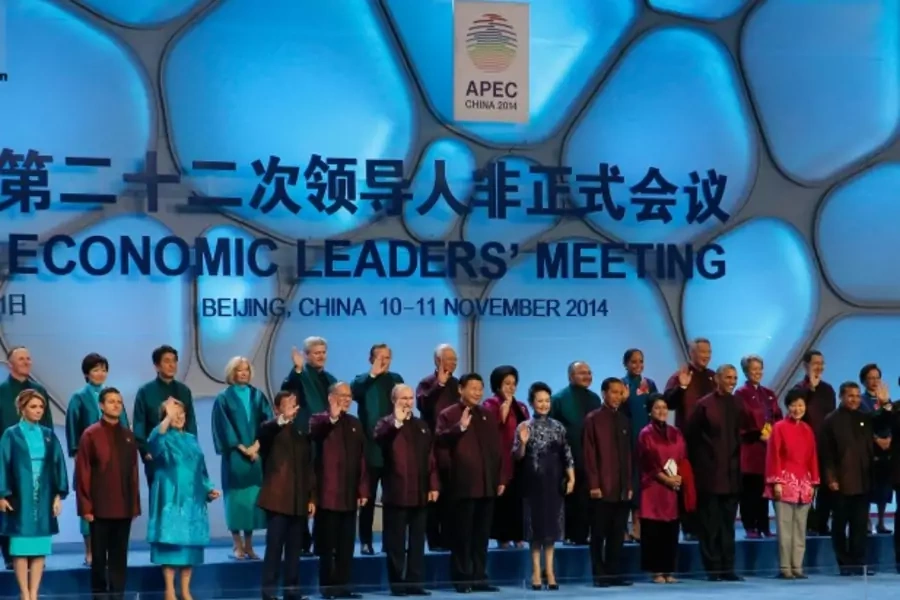Friday Asia Update: Top Five Stories for the Week of November 14, 2014

More on:
Ashlyn Anderson, Lauren Dickey, Darcie Draudt, Andrew Hill, Will Piekos, and Sharone Tobias look at the top stories in Asia today.
1. Obama and Xi strike deals at APEC summit. The Asia-Pacific Economic Cooperation (APEC) forum proved remarkably productive for U.S.-China relations this week. U.S. President Barack Obama and Chinese President Xi Jinping jointly announced commitments to cut carbon emissions, and agreed to a reduction in tariffs on a range of technology products, to greater communication between their militaries in the Pacific, and to extend the duration of visas. Though these agreements are certainly a welcome change from years of stagnating relations, underlying issues still remain. China and the United States have fundamentally different visions of Asia’s security and trade architecture that are not easily reconciled.
2. Abe tries to repair regional ties at APEC. After nearly two years in office, Japanese Prime Minister Shinzo Abe and President Xi finally met, speaking briefly on the sidelines of the APEC summit on Monday. While the meeting only lasted twenty-five minutes, many are hailing it as an important step in repairing Sino-Japanese ties and deescalating tensions in the East China Sea. The brief encounter comes in the wake of last week’s four-point understanding on improving relations. Later in the week at the East Asia Summit in Myanmar, Abe also expressed hopes for a Japan-China-South Korea trilateral meeting in the near future.
3. Obama attends East Asia Summit in Myanmar. President Obama met with Myanmar President Thein Sein in Naypyidaw on Thursday while visiting the country for the annual East Asia Summit. During the meeting, Obama encouraged Thein Sein to pursue greater political reforms and end persecution of Rohingya, a Muslim ethnic minority in western Myanmar facing violence from the majority Buddhist population. Myanmar leaders call the minority Bengali rather than the internationally preferred “Rohingya,” and have refused to grant members of the minority citizenship. Obama also met with opposition leader and fellow Nobel laureate Aung San Suu Kyi.
4. North Korea releases two American prisoners. U.S. Director of National Intelligence James Clapper traveled to North Korea to negotiate the releases of Matthew Miller and Kenneth Bae, arriving with a brief letter from President Obama to North Korean leader Kim Jong-un in hand. Mr. Bae said he spent an “amazing” two years in prison after he was detained on charges of using a Christian evangelical organization to preach against the North Korean government. Mr. Miller entered North Korea earlier this year, tearing up his visa and asking for asylum; he was instead charged with unruly behavior. After the release last month of Jeffrey Fowle, another American detained by North Korea, the releases could be evidence that Kim Jong-un is making initial overtures toward the Obama administration.
5. U.S.-India deal rejuvenates WTO Trade Facilitation Agreement. Ahead of the Group of Twenty meeting this weekend, the United States and India reached a breakthrough agreement allowing India to continue its food subsidy program without the fear of being challenged in the World Trade Organization (WTO) until a permanent solution to food stockpiling is reached. India has been under mounting pressure since it withdrew its support for the package of trade facilitation measures agreed upon at the WTO meeting in Bali last December. With the impasse broken over food stockpiling, the WTO has announced that there is a “high probability” of passing the Bali trade package within two weeks. The Bali agreement is expected to add $1 trillion to the global economy and create twenty-one million jobs.
Bonus: APEC outfits take world leaders where no one has gone before. The APEC forum traditionally includes a photo op in which attending world leaders wear the traditional dress of the host country; this year’s outfit drew comparisons to the uniforms of Star Trek. APEC apparel have drawn a variety of reactions before—click here for a rundown of the top ten.
More on:
 Online Store
Online Store